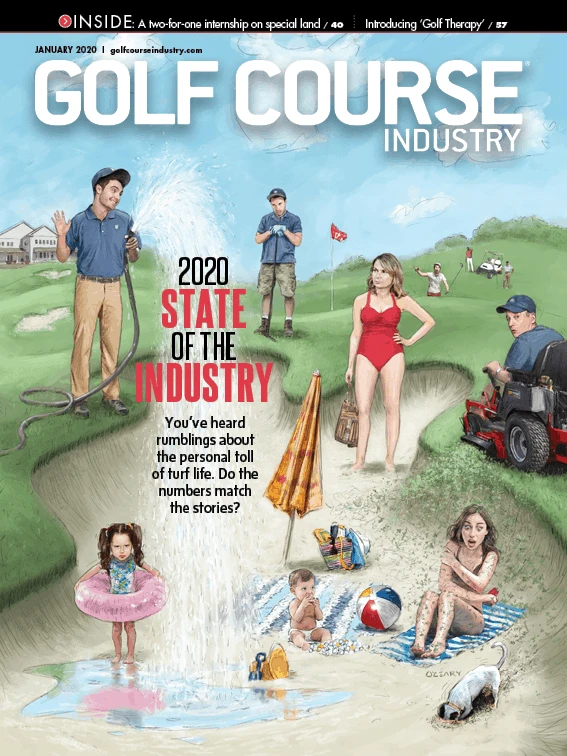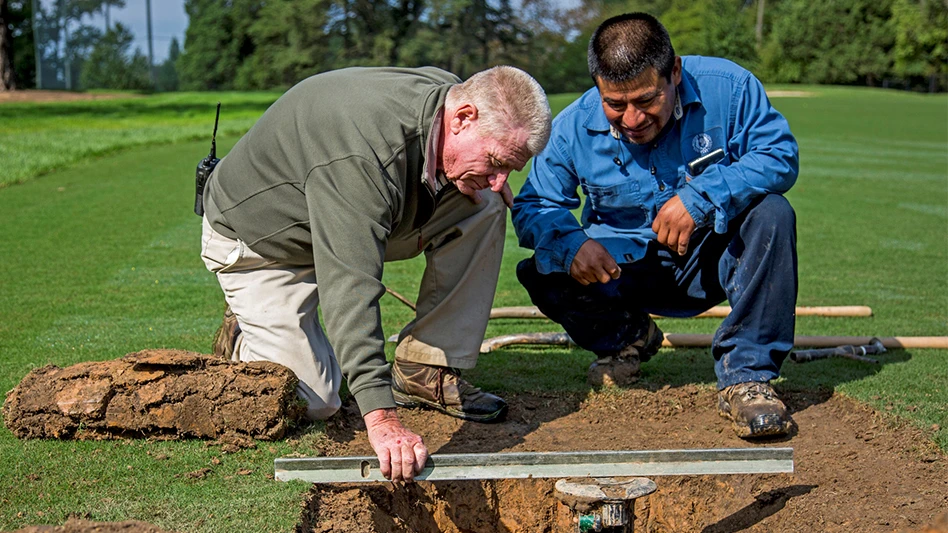
I will soon begin my fifth decade in the golf management profession. I am from Indian Creek, Georgia, a rural community east of Atlanta, where I was president of our Future Farmers of America chapter and had perfect attendance every year in school. Lewisville, Texas, is now home base. In golf, I have worked for 15 general managers, 12 directors of golf, eight management groups/owners and four properties. Along the way, I learned a lot about being a successful golf course superintendent, the toll it takes on the individual (and their family) and kept very accurate records to navigate my career path. If you are currently charting your course through the golf course superintendent profession, allow me to share some practical advice and numbers behind the price of success from a vintage superintendent.
Got time?
Time is the cornerstone of human pursuit. Throughout your journey as a superintendent you will be asked how many hours you work and what you accomplish during those hours. It is important to gain perspective and document how you invest your time each day – and if you feel it is a good or bad investment. We all get 24 hours each day, but it is how we embrace our use of time that leads to happiness or discontent.

You must develop a system of time management. It does not matter if it’s electronic or an old school notebook or Day-Timer, make a habit out of setting a schedule that is aligned with tasks, tracking your actual hours worked to complete the tasks required. This will give you an advantage mentally. It is always your choice whether to be on property and to what level or direction you will apply your craft while there. My rule is never be angry about the time required by your job, verify that your time to compensation ratio is a win-win. In short, can you do the job well with the resources extended?
The moment your property invades your personal time too much, it is time to move on. The pain and suffering that results from a mismatch on the work time vs. personal time equation can be epic, creating serious mental and physical health issues. Everyone’s work-life balance is different, and as you move through your career, it can and should change. On two occasions (major renovations), I worked 101 and then 126 days in a row without a day off, but I was at home to start and end every day. It was much more stressful for me (during my time as a salesman) to be away from home for several weeks at a time than to work so many days in a row. It comes down to perspective.
I have detailed hours worked records dating back to the early 1980s. I mix computer and hand-written notes to capture the data. The most hours I worked in a year was 3,701; the fewest was 2,352. The most hours I have ever worked in a week for years was in August 1989 at 93 hours until May 2017, when I posted a 112-hour week. These two benchmarks coincided with televised tournaments held at both clubs.
My secret is that I have really loved every golf job I have ever had and gladly traded the time invested for the opportunity. Take the time to quantify and record the time investment required for your current job and reaffirm if you are in the right place. You are the only expert qualified to complete this assessment. This process is one of my highest priorities and critical to my success.
Money is a tool

We tend to not talk openly about salaries and personal finance. The reason that I included this polarizing topic is to help every superintendent realize that money is a tool. Money can build up or tear down. Money magnifies your habits and emotions. Ever wonder why a multimillion-dollar athlete can be bankrupt a few years into retirement, but a janitor in a small town can retire in relative comfort for years? Have you ever asked yourself, How am I doing financially?
Over the years, I have heard general rules of thumb that I am happy to share, such as multiply your age times 1,000 and that or higher should be your annual salary. Your age times your annual salary divided by 10 should be your net worth at any point in life. I have also been advised that to retire well you need to be placing 15 percent of your income into your retirement accounts. That number was 10 percent 20 years ago. Here are a few money tips from a budget-centric superintendent.
- Pay yourself first and save something every week.
- Have three to six months of living expenses in reserve (bad times can find good people).
- Get the best insurance (health, dental, vision, car, home, disability). I have had 24 broken bones, five major surgeries (get short- and long-term disability), owned three houses and totaled one truck, so I have been there. Insurance kept our family going in tough times.
- Save as much as you can as early as you can. Maximize any company match to a 401(k).
- Cash is king. Avoid short-term, high-interest debt.
- Avoid student loan debt. I creatively paid my way and it moved me to the head of the class.
- Negotiate everything, make every dollar count and barter.
Master your craft
One of my early mentors was Jim Biggar Sr. He was the CEO of Nestle in the 1980s, when our property hosted the LPGA’s Nestle World Championship of Women’s Golf. I still keep a note from him in my Day-Timer. He taught me that to be the best in anything, you must commit to lifelong learning and a legacy of excellence.
Formal and/or informal education should fill your years in the golf industry. Certifications, licenses, degrees and seminars (live and online) must be embraced at the highest level possible. Being multilingual is another huge advantage. I have been a GCSAA Certified Golf Course Superintendent since 1998. I am also an International Society of Arboriculture Certified Arborist, but my first professional certification was in 1993, earning Certified Grounds Manager Status with the Professional Grounds Management Society. It takes roughly 10,000 hours to master anything. Starting and staying the course is important.

Following this philosophy, I have won 37 industry awards, including seven GCSAA awards. I have served 18 years on GCSAA chapter boards of directors, serving as president of the Georgia chapter in 2010-11 and I am currently vice president of the North Texas GCSA. In 2018, I was inducted into the Georgia GCSA Golf Course Superintendents Hall of Fame for mastering my craft and sharing it with others.
I am most proud of the 21 superintendents and business owners who started their careers with us and are mastering their craft across the country. You all made me better. THANK YOU. Shout out to James Thomason (Mountain Man Beard Products), Ronny McFarland (Evergreen Landcare) and recently certified Cortland Winkle (TPC Four Seasons Dallas).
Manage your health. your life depends on it
Your health is your greatest asset. Nothing can ruin plans to conquer the golf industry like a major health problem. I enjoyed excellent health most of my life. But I have experienced a few health adventures: a major wreck driving to work in 1986, a lost gallbladder in 1995, getting struck by lightning in 1999 and the discovery of a birth defect in my heart (prompting a ride in the life-flight helicopter) in 2014.
Now more than ever you need a health care team to make sure you live long and prosper. Your health care team should include a primary doctor, dentist and an array of specialists as needed. We as superintendents tend to over-do things. Watch what you eat and avoid alcohol, drugs and tobacco. Have annual physicals (and a trip to the dermatologist as well, sun lovers) and a colonoscopy for the 50 and over crowd. These screenings have saved my life (evidenced by three polyps and a heart valve) and may save yours.
I do not drink or smoke, but I sure enjoy food. I have learned a new word: moderation. I lost more than 60 pounds last year. I am a bit of an expert on sleep. I never slept much most of my life, which gave me more hours to chase my dreams. But sleep is critical to good health and superintendents just keep going no matter what. Eventually you crash. Take a sleep study if you have symptoms and follow the recommendations.
I have lost friends and family to depression and suicide. If you need help, reach out to someone. Remember you are wonderfully made and highly valuable. Superintendents are a family and we are in this together.

Have a hobby that’s fun
It is safe to say that if you have read this far, or have similar work or time commitments, you may think you do not have time for hobbies. However, if you have a stressful job and work long hours, you need a hobby to help you turn off the stress. Hobbies are the spice of life, so have fun. Hunt, fish, paint, cook, volunteer, read, golf or bowl … find something to do because it makes you happy.
I have many hobbies, but the ones that stand out are martial arts, archery and writing. I helped pay for my turf degree at Abraham Baldwin Agricultural College by teaching martial arts from 1982 to ’85. I have participated in hundreds of tournaments in traditional martial arts and archery. I have also published two books and dozens of articles.You need a life beyond the golf course. It should be as big as your ability to dream. No excuses, no regrets. Just have fun.
Superintendents are complex creatures who magically blend art and science. Those rare superintendents who enjoy long tenure and sustained success have laid the foundations our industry is built upon. While not perfect, they strive for perfection in all they do. I hope by sharing some of my successes and struggles you will find useful strategies and inspiration.
Get curated news on YOUR industry.
Enter your email to receive our newsletters.

Explore the January 2020 Issue
Check out more from this issue and find your next story to read.
Latest from Golf Course Industry
- Beyond the Page 65: New faces on the back page
- From the publisher’s pen: New? No way!
- Indiana course upgrades range with synthetic ‘bunkers’
- Monterey Peninsula CC Shore Course renovation almost finished
- KemperSports and Touchstone Golf announce partnership
- PBI-Gordon Company hires marketing manager Jared Hoyle
- Mountain Sky Guest Ranch announces bunker enhancement project
- GCSAA names Joshua Tapp director of environmental programs





